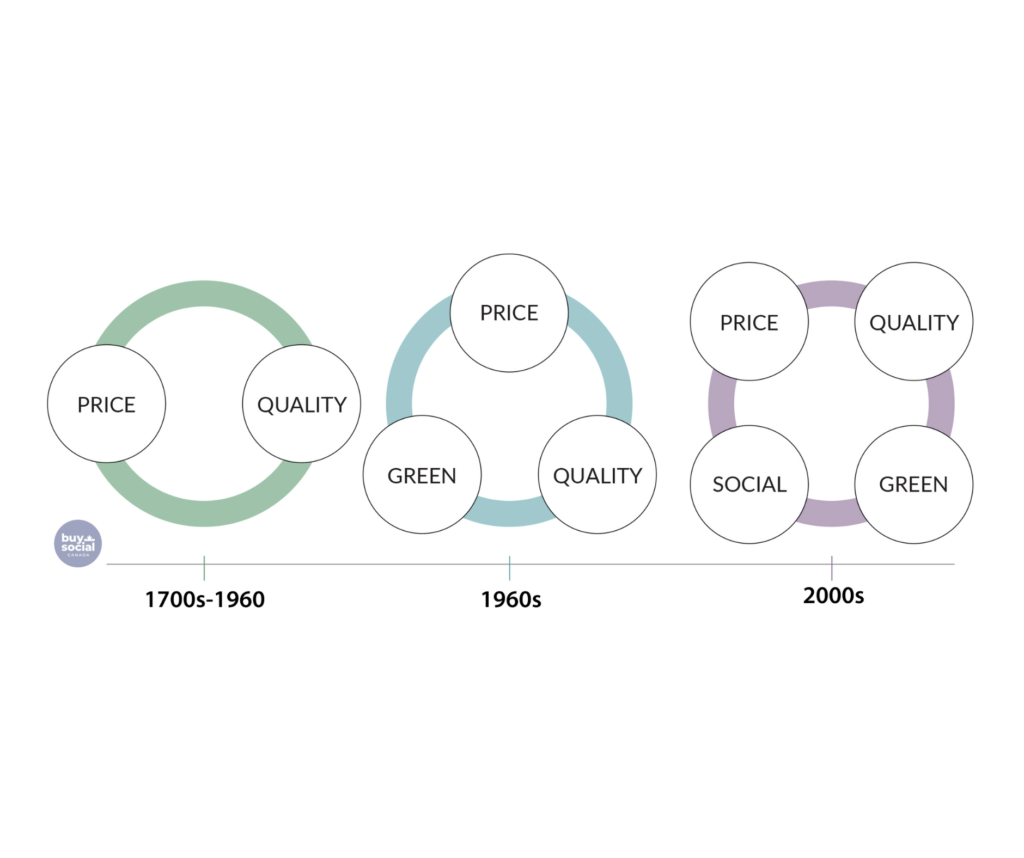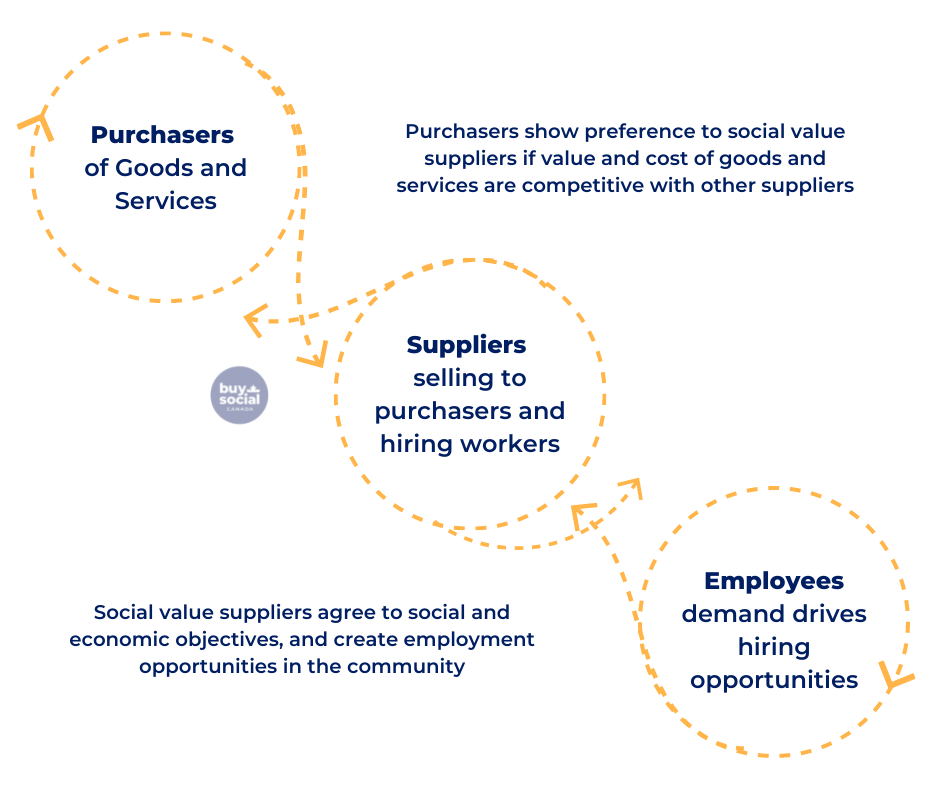Advocacy
Buy with impact to create employment opportunities for persons with disabilities
May 27th, 2022
Version Française ici.
This thought piece has been sent to Federal Ministers to advocate for social procurement.
The complex and persistent need to create effective employment for persons with disabilities continues to be a puzzling, compelling and very necessary challenge to solve.1
Buy Social Canada believes that social procurement offers a demand side, market-based solution to create employment opportunities for persons with disabilities. A connection to employment is a critical aspect of addressing related problems of poverty, health, and social inclusion.
A successful social procurement strategy to increase employment for persons with disabilities will require a cross sector, multi-ministerial effort that integrates existing policy and programs.
How did social procurement evolve?
Twenty years ago, a community collaboration of employment service providers in Vancouver’s Downtown Eastside recognized a fundamental problem. “Overall, the employment service model operated on the supply side, focusing on training, rather than employment.”2 From that finding they explored innovative approaches to increase the success of their training and employment readiness services. One avenue was to use a demand side model. What would incentivize employers to make the shift toward a more inclusive work force, including persons with disabilities? With further research and the evolution of policy and practice, today we refer to this model as social procurement.
Social procurement is based upon the premise that every purchase has a social, economic, cultural, and environmental impact. Social procurement intentionally leverages a social value from existing purchasing of goods, services, construction and infrastructure. Social procurement is evolving as a valuable policy implementation tool for governments to achieve their social goals.
Social procurement takes place by including a social value component, along with technical needs, environmental impact, and price, into the purchasing process of seeking bids and contracting for outcomes. Social procurement is dramatically changing the traditional culture and practice of procurement procedures.

Social procurement happens whenever purchasers prioritize or include a weighted value for the suppliers that provide employment for persons with disabilities. Social procurement ‘rewards’ contracts to the suppliers that provide quality products, competitive pricing, environmental care, and social value. Social value, which could be the creation of targeted jobs for persons with disabilities, becomes a market advantage and solves a complex social issue.
A scan of the Buy Social Canada Social Enterprise Directory3 offers multiple examples of potential suppliers of goods and services who employ persons with disabilities like Vancouver-based Clean Start BC and Halifax based LakeCity Works. The suppliers exist, and their social value employment impact grows with every contract from purchasers.
Evidence of impact
In 2017 Ernst & Young undertook a Social Return on Investment (SROI) analysis for social enterprise Atira Property Management in Vancouver, which states, “Analysis conducted by Ernst & Young shows that, for every dollar spent to employ a target employee group in 2016, Atira Property Management Inc. (Atira) has realized a social return on investment (SROI) of $4.13, an improvement over Ernst & Young’s 2013 SROI report of $.81. Further, 88% of those hired believe their life circumstances have improved since they started work.”4
A similar research project by BUILD, a social enterprise in Winnipeg, found that “through a total investment of $2.56M by Manitoba Housing and other government and non-profit agencies, the four social enterprises created a social and economic return on investment with a total present value of $5.995M. This means that for every dollar invested $2.23 of social and economic value was created.”5
Recent social value reports from CleanStart BC, a junk removal and pest control social enterprise in Vancouver, illustrates their outcomes, with 18,600 hours of employment to people with barriers in 2020.
EMBERS Staffing Solutions, a social enterprise that employs persons with barriers to employment, won the Governor General’s Innovation Award, demonstrating how employment is a means to address issues like mental health.6
The social procurement equation is quite simple: with increased contracting to social enterprises and businesses that employ persons with disabilities, the employment opportunities increase.

This diagram shows the direct connection between growing the demand for social value suppliers’ goods and services and an increase in targeted employment opportunities.
Public policy context
Social procurement was embedded in Bill C-277 introduced in 2016 by then MP Hussen, and then in 2018 a similar Bill, Bill C-344 was introduced by MP Sangha. In the summer of 2021, Treasury Board announced a new procurement direction. “As the largest public buyer of goods and services, the Government of Canada can use its purchasing power for the greater good. We are using our purchasing power to contribute to socio-economic benefits for Canadians, increase competition in our procurements and foster innovation in Canada.”7
The recent Mandate Letter in December 2021 to Minister of Employment, Workforce Development and Disability Inclusion commits the government to finalize and release Canada’s Disability Inclusion Action Plan which specifically states, “getting more persons with disabilities into good quality jobs.”8
The recent Federal Budget released April 2022, confirmed “The federal government is steadfast in its commitment to an inclusive recovery—and we cannot leave persons with disabilities behind.” The budget document validates a market approach by recognizing that inclusive employment “will help to address labour market shortages through increased participation by persons with disabilities and make workplaces more inclusive and accessible.”9
Multiple municipalities across the country are leading the social procurement process, including Victoria, Calgary, Winnipeg, Toronto, Peterborough, and Halifax; along with the Provinces of BC, Manitoba, and Newfoundland and Labrador.
Recommendations for next steps
Buy Social Canada believes it is time to explore a cross ministerial social procurement initiative targeted at creating employment for persons with disabilities.
We recommend the process include the following components:
- Increase Supplier Capacity
- Provide procurement readiness training for social enterprises and social value suppliers that employ or wish to employ persons with disabilities
- Connect potential social value suppliers with existing employment service providers
- Increase Purchaser Capacity
- Provide purchaser engagement and training on social procurement policy and practice
- Identify Opportunities
- Conduct supply chain analysis for Tier 1 suppliers and provide advice on how to leverage their existing procurement and supply chains
- Connect demand opportunities with potential suppliers
- Support Social Procurement Implementation
- Create and share of best practices across sectors, such as RFx templates with inclusivity language, weighting, and metrics
- Enhance the business case for social procurement and employment for persons with disabilities
- Support pilot initiatives
- Case Studies
- Share metrics and reporting models
End Notes
- https://www.canada.ca/en/employment-social-development/campaigns/hiring-persons-disabilities.html
- Horizons Magazine, February 2006, Volume 8 Number 2
- Buy Social Canada Certified Social Enterprise Directory
- ATIRA Social Return on Investment Report
- https://ccednet-rcdec.ca/en/toolbox/social-return-investment-four-social-enterprises-manitoba
- EMBERS Governor General’s Innovation Award
- https://www.tpsgc-pwgsc.gc.ca/app-acq/ma-bb/aaf-ifp-eng.html
- https://pm.gc.ca/en/mandate-letters/2021/12/16/minister-employment-workforce-development-and-disability-inclusion
- Federal Budget, April 2022, page 124

